Washing Machine Is Smoking Inside? (5 Reasons for the Smoke & How To Fix It!)
The reason why your washing machine may be smoking inside boils down to just five things. If you notice smoke while your washing machine is running and asking yourself, “Why my washing machine may be smoking inside,” you will find the answer here.
A loose or wobbly drum, a clogged drain pump, a damaged top plug, or a frayed power cord are why your washing machine may be smoking inside. The first step in fixing either of these issues is turning the machine off and unplugging it from the outlet.
For more information about why your washing machine is smoking, keep reading – regardless of whether you are experiencing this problem with a front load or top load washing machine.
This article covers the most common issues that you are likely to encounter!
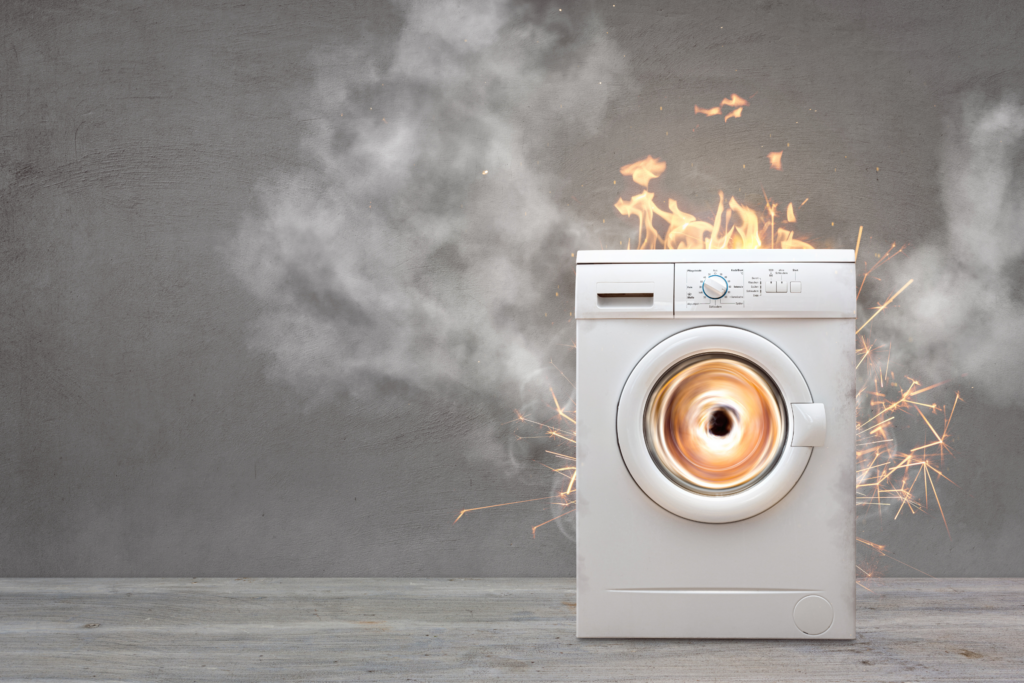
Is it normal for a washing machine to be smoking inside – based on expert experience
Washing machines should run smoothly without wobbling, sparking, or smoking. What should you do if yours may be smoking inside?
It is not normal for a washing machine to be smoking inside. If smoke comes from inside your washing machine, turn it off, unplug it, and call a licensed home appliance repair technician to diagnose and fix the issue.
Don’t sit around and wait to diagnose the issue yourself by rerunning the washing machine. Smoking washing machines can quickly become a bigger issue, like a sparking outlet that can lead to a fire.
Clogged drain pumps and a loose drum are the most common causes of smoke inside the washing machine drum.
Let’s go into more detail with these home appliance issues.
5 reasons why your washing machine may be smoking inside (common issues)
Smoke on the inside of your washing machine is a serious hazard. If you experience a burning smell or see smoke, turn it off and unplug it immediately.
Here are four reasons why a washing machine may be smoking inside:
- The washer drum is loose or wobbly
- Belt is misaligned or worn out
- The drain pump is jammed
- The washing machine plug is faulty or damaged
- The power cord needs to be replaced
Work through the list to see which cause is contribution to your appliance issue.
The washer drum is loose (replace the spider bearing)
Washing machine experts agree that one of the most common reasons why your washing machine could be smoking because is because the drum is loose or wobbly.
When this happens, the drum creates friction between itself and the rubber washing machine door casket, causing smoke buildup or a burning smell.
Older washing machines that shake, rattle, or make a loud grinding noise commonly have this issue. You’ll have to replace the spider bearing inside your washing machine to fix it.
Unbalanced washing machines can also make them wobble, but this typically doesn’t cause them to smoke on the inside.
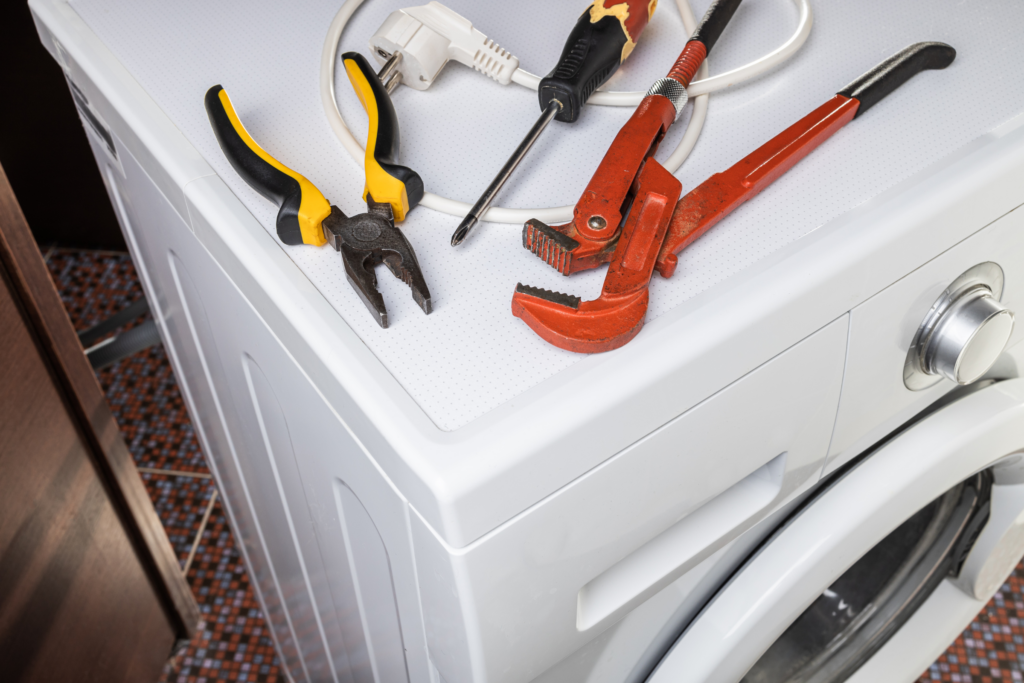
Belt is misaligned or worn out
A drive belt issue in a washing machine causing smoke might sound unusual, but it’s entirely possible under certain conditions. A faulty of burning drive belt can definitely cause smoke!
Here’s how it can happen:
- Friction: The most common reason a belt might cause smoke is due to friction. If the belt becomes misaligned, it can start to rub against other parts of the machine. This friction can cause the belt to overheat and start to produce smoke.
- Stuck Drum: If something impedes the drum from turning (like a piece of clothing getting caught in a way that jams the drum), but the drive motor keeps trying to turn the drum via the belt, the belt can get stretched, slip, or become excessively strained. This action will cause a lot of heat in the back due to the friction and can result in smoke.
- Worn-out Belt: A belt that’s old and worn out might not have the flexibility it once did and could lead to a slipping drive. If it’s unable to grip the pulleys properly or starts to degrade, it can also create more friction than usual. Bits of the belt could even start to break off and get caught in the machine, leading to more smoke.
- Foreign Objects: If a foreign object gets stuck between the belt and one of the pulleys (or in the path of the belt), it can cause the belt to slip or get jammed. The friction and heat generated from this can cause smoke.
The drain pump is clogged with loose items
Does the drain pump run smoothly, or does it sound stuck? Is the washer able to drain water from the tub? If not, then the pump may be stuck and unable to rotate.
A clogged drain pump is enough for smoke to build up inside your washing machine, especially after the spin cycle. At the very least, it can give off a burnt rubber or smokey smell.
Clogged drain pumps prevent the pump’s motor from turning, causing smoke to build up in the washing machine. Prevent this by removing whatever is blocking the drain pump; loose change, pens, tubes of chapstick, and other miscellaneous items left inside laundry commonly block drain pumps.
This can be a complicated fix; don’t hesitate to contact a qualified washing machine technician.
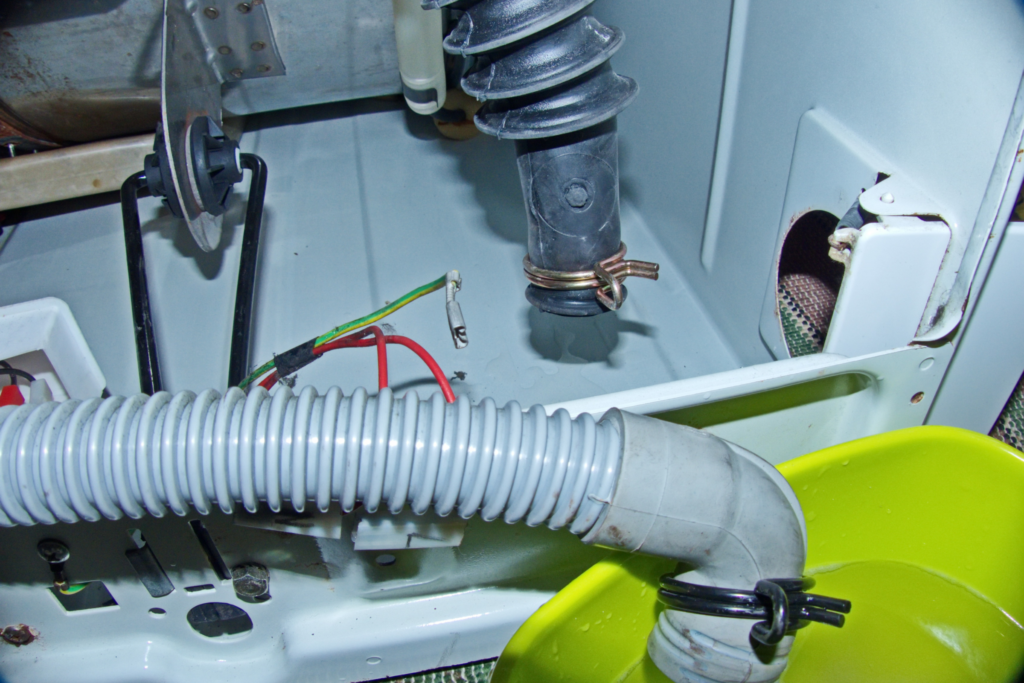
The washing machine plug is faulty or damaged
Loose wire connections in the top plug (the three-pronged plug at the end of the power cord) can cause your washing machine to start smoking. A damaged power cord can also spark and cause smoke.
Check your top plug for burn marks on the wiring. Replace the plug if there are burn marks or if any of the prongs are loose. Likewise, if the plug does not fit firmly into the wall outlet when you press firmly, the plug or outlet may a replacement.
Either of these issues can cause sparking at the outlet and may result in smoke or a burning smell. Turn off your washing machine immediately if this happens.
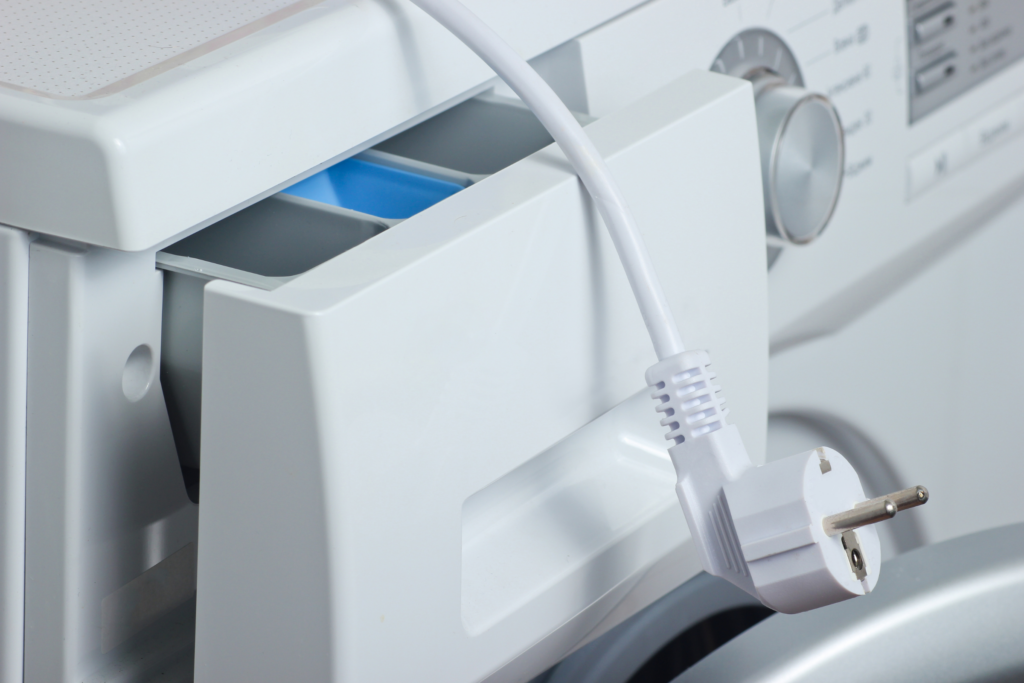
The power cord is damaged (check for exposed wire)
Inspect the power cord along its length for any physical signs of damage to the insulation or chafing. It should also be fairly obvious if their is smoke coming from the back of the washing machine rather than inside of it.
Damage to the insulation can lead the conductors to short, spark, and give off a burning smell in the washing machine due to the excessive current that flows in the event of a short.
The breaker protecting the electric circuit to which the washer is connected will trip.
If there is any damage to the cord, replace it with another of the same type and gauge.
What to do if your washing machine is smoking inside – don’t ignore the problem
Smoking washing machines require immediate attention. The first step is to turn it off and unplug it from the wall.
If your washing machine is smoking inside, turn it off, unplug it or switch the breaker off, and let the smoke out. Common causes for smoking include a damaged spider bearing, clogged drain pump, or faulty plug. Contact a qualified washing machine repair technician to diagnose and fix these issues.
It’s unsafe to continue running your washing machine after it starts smoking. Don’t rerun it to look for potential smoking causes, as you risk creating an electrical fire.
The safest thing to do is to turn it off, unplug it, and call a professional or expert to help with the problem.
You should also consult your user manual or product manual for information on warranty options and options for appliance service technicians.
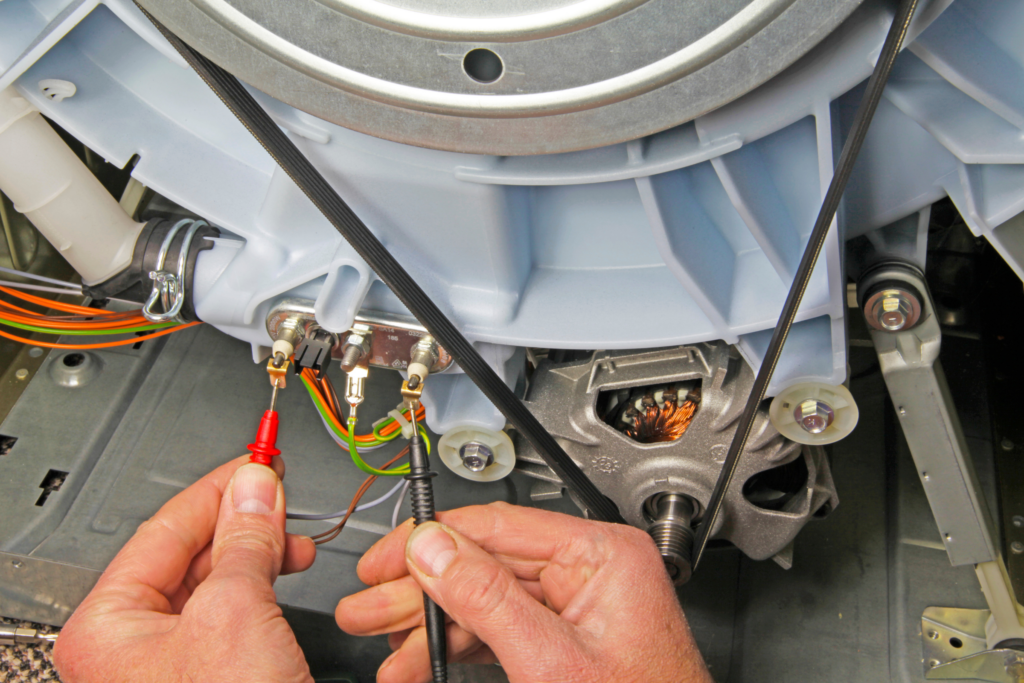
What causes a burning rubber smell during the spin cycle?
The burning rubber smell from a washing machine during a spin cycle is unanimous with loose or wobbly machine drums.
A damaged spider bearing causes a burning rubber smell during the spin cycle. If the bearing is misaligned, the machine drum wobbles and creates friction between the drum and the rubber door gasket, causing smoke or a burning smell.
The burning rubber smell may be from the door seal that is out of position and in contact with the spinning drum with the heat generated due to the friction acting on the door seal rubber and generating the burning smell.
Confirm if the door seal and the drum are properly fixed. Do not hesitate to contact a qualified washing machine technician for support.
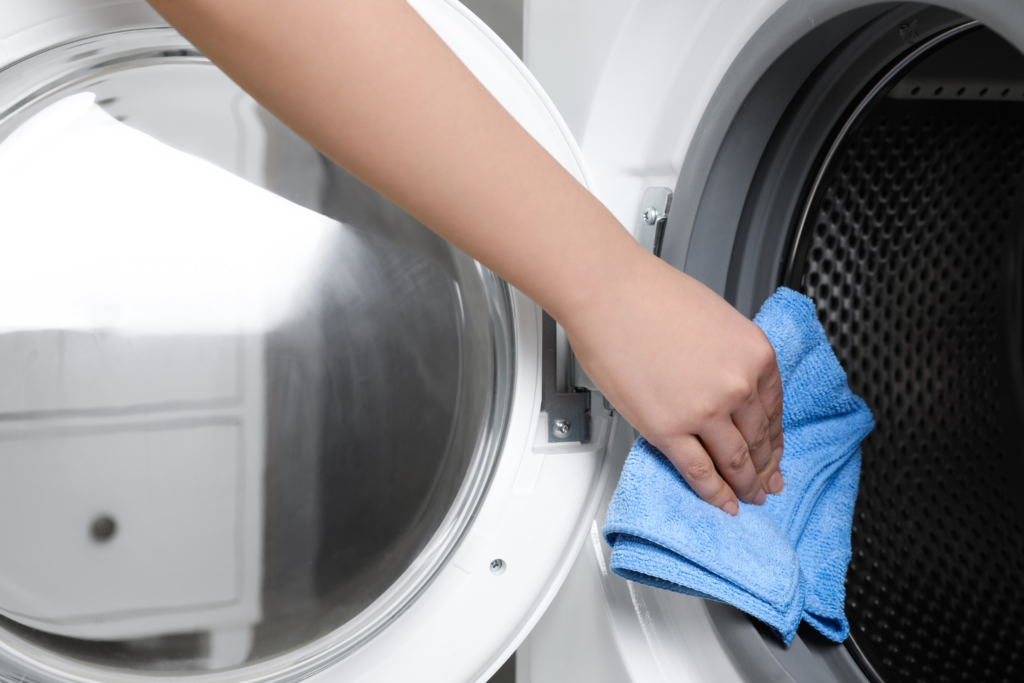
Can a washing machine catch fire after smoking inside?
Washing machines and other household appliances are at risk of fire. Can a washing machine start a fire?
A washing machine can catch fire if electrical components are damaged or if the top plug or outlet it’s plugged into is damaged. Smoke or burning smell coming from a washing machine indicates danger and should be addressed immediately.
According to a research report issued in 2017 by the National Fire Protection Association, over 15,000 fires from a combination of washing machines and clothes dryers occurred from 2010-2014, resulting in property damage, injuries, and sometimes death.
The leading cause of washing machine fires was mechanical and electrical failures. Basically, this is not a problem with your washing machine that you can choose to ignore.
There have also been incidents of washer components catching fire.
To minimize the risk of fires:
- Follow the recommended installation procedures, including but not limited to connecting to the recommended electrical circuit amperage circuit, using the recommended power cord type, proper grounding, and circuit breaker protection;
- Install the washing machine in a cool, dry place away from any heat source. Consult the washer installation manual and always follow the installation instructions provided by the manufacturer;
- Turn off and unplug the washing machine if you see or smell smoke from anywhere in or near the machine.
Summary of why smoke is coming from your washing machine
The washing machine smoking inside could be from a loose drum or broken spider bearing, a clogged drain pump, a faulty plug, or a damaged or frayed power cord.
Immediately turn off and unplug your washing if it starts smoking at any point. Do not hesitate to contact a qualified technician for assistance with this appliance as it can be fairly difficult to diagnose and fix this problem.
Let Us Know How We’re Doing!
Did this expertly prepared resource answer your question?
Do you have another question about home maintenance, home improvement projects, home appliance repair, or something else?
Get more information, send in questions and keep the discussion going by contacting the I’ll Just Fix It Myself company customer service team at at 1-800-928-1490 or Email us at [email protected]
